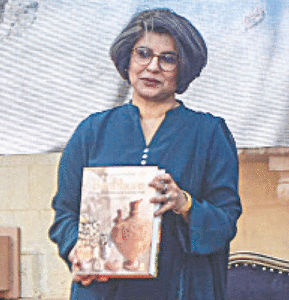KARACHI: The 9th Karachi Literature Festival will be held on Feb 9, 10 and 11, 2018. This time around 131 Pakistani and 30 international speakers, representing nine countries, will participate in the event.
This was said by co-founder of the festival and managing director of Oxford University Press Ameena Saiyid at a press conference at the Arts Council on Wednesday.
She said it was the first presser related to the ninth edition of KLF. It all started in 2010, and in 2019 the festival would celebrate its decade. “The Karachi Literature Festival has become the mother of all festivals. Now there are music, theatre and culture festivals,” she remarked.
‘Karachi is open’, say organisers
Ms Saiyid said the mayor of London in his recent visit to Pakistan had said that ‘London is open’… open for cultural activities, for business. She said from the KLF platform that she’d like to say “Karachi is open”.
She told the media that last year 200,000 people attended KLF, which was a record. The entry to the venue was free because “we want people from all over Pakistan to come. We don’t want any barriers”. In 2018, there would be 131 Pakistani and 30 international speakers representing nine countries: Pakistan, India, the UK, Germany, Singapore, the Maldives, France, Canada and the United States. The varied programmes included panel discussions, book launches, English and Urdu mushairas, dramatised readings, performing arts, and film and documentary screenings.
She said there would be 65 sessions and 19 book launches to choose from. The keynote speakers on the opening day were Dr Francis Robinson and Noorul Huda Shah, while Indian novelist Amit Chaudhuri and distinguished writer Anwar Maqsood would deliver keynote speeches on the closing day. There would be four major prizes beginning with Pepsi non-fiction prize, the Getz Pharma prize for fiction written in English, the KLF Peace prize sponsored by the consulate general of Germany, and the Infaq Foundation Urdu literature prize.
The winners would be decided by juries comprising eminent scholars. For the non-fiction prize, 20 entries were received. The long list included: Lahore in the Time of Raj by Ian Talbot and Tahir Kamran, How Pakistan Got Divided by Rao Farman Ali, A History of the Judiciary by Hamid Khan, Urban Traditions and Historic Environments in Sindh by Anila Naeem, Imagining Pakistan by Rasul Baksh Rais and Honour Unmasked by Nafisa Shah.
Aamer Naseer of Getz Pharma told journalists about the long list for fiction in English: The Golden Legend by Nadeem Aslam, Exit West by Mohsin Hamid, The Party Worker by Omar Shahid Hamid, The House of Clay and Water by Faiqa Mansab, Daddy’s Boy by Shandana Minhas, Boy of Fire and Earth by Sami Shah, Snuffing out the Moon by Osama Siddique and Home Fire by Kamila Shamsie.
Consul General of Germany Rainer Schmiedchen said 15 entries were received for the German peace prize. Describing the positive narratives that KLF generated, he told the media that one of the journalists, Dr Hein, of the important newspaper of Germany, the Frankfurter Allgemeine Zeitung (FAZ), wished to come to Karachi, and would be here for KLF. The peace prize long list: Imagining Pakistan by Rasul Baksh Rais, Indus Waters Treaty: Political and Legal Dimensions by Ijaz Hussain, Prison Narratives by Akhtar Baloch, Love in Chakiwara by M. Khalid Akhtar translated by Bilal Tanwir, Islamophobia and Securitization by Tina Saeed and The House of Clay and Water by Faiqa Mansab.
Co-founder of KLF Asif Farrukhi announced the list for Urdu literature prize: Deed wa Deed by Altaf Fatima, Neeli Baar by Tahira Iqbal, Rail Ki Seeti by Mohammad Hasan Mairaj, Qila-i-Faramoshi by Fahmida Riaz, Urdu-Hindi Tanaza Aur Punjabi Zabaan by Naveed Shehzad and Aatey Hain Ghaeb Sey by Anwar Shaoor.
Published in Dawn, December 14th, 2017













































Dear visitor, the comments section is undergoing an overhaul and will return soon.